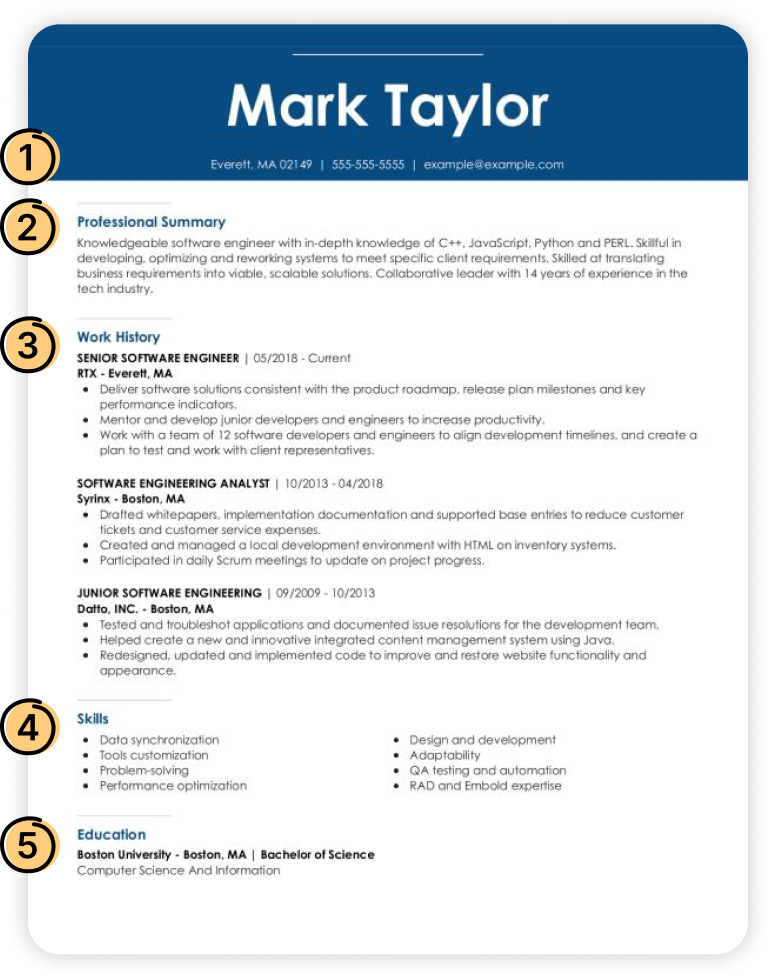Top Resume Examples for 2025
Resume Examples by Job Title and Industry
Administrative resume examples (9)
For those with expert organizational and time management skills, our administrative resume samples will help you highlight your ability to coordinate, prioritize and organize schedules, information and people.
Are you brilliant when it comes to handling money, but you’re not sure how to express that on your resume? Our resume examples will help you draft your own financial industry resume with confidence.
Put your creative, analytical and problem-solving skills front and center to land a job in business operations. These samples are perfectly calibrated to push you forward.
Build a structurally sound resume with our construction resume examples that show you how to highlight essential skills, such as reading blueprints and managing expenses.
Education resume samples (4)
No matter what you do in the education field, our examples will show you how to emphasize your skills, from problem-solving and critical thinking to active listening and classroom management.
Bring your analytical and critical thinking skills to life with an exceptional, next-level engineering resume. These resume samples can act as a blueprint for creating your job-winning document.
Entertainment resume samples (4)
Whether you want to be behind the scenes or center stage, you need a solid entertainment resume as your calling card. These examples will give you an advantage over the considerable competition.
Regardless of your role in the hospitality industry, let our resume examples show you how to emphasize your customer service skills, flexibility and adaptability so your application gets a five-star rating.
You need a resume so good you wouldn’t hesitate to hire yourself. These resume examples will give you ideas for crafting a human resources resume that’s strong enough to bypass even the toughest ATS.
Our resume examples for IT jobs give you the tools you need to set yourself apart in a competitive market. These examples have been tried and tested in the industry.
Insurance brokers, agents and adjusters need a resume that will help them stand out from other qualified candidates. Increase your chances of getting a callback by leveraging our examples.
Whether you’re a legal secretary, paralegal or legal intern, our sample resumes will help you fill out your resume sections in compliance with the job description — and land the job you’re seeking.
For a marketing guru, your most valuable product is yourself. Use these examples of great resumes to learn how to best promote your communication skills, CRM acumen and innovative mindset.
As a medical industry worker, you have impressive technical know-how, certifications, soft skills and professional achievements. These examples will help you understand how to show these strengths in the best light.
The competitive field of nursing demands a resume that grabs the attention of prospective employers. Luckily, we have a variety of great, keyword-rich nursing resume examples to help you land a job.
- Cardiovascular Operating Room Nurse
- Nursing CNA
- Clinical Nurse Manager
- Emergency Room Nurse
- Family Nurse Practitioner
- Geriatric Nurse
- Hospice Nurse
- House Supervisor Nurse
- Interventional Radiology Nurse
- Labor And Delivery Nurse
- Legal Nurse Consultant
- Licensed Practical Nurse
- Medical Surgery Nurse
- Neonatal Intensive Care Nurse
- New Grad Nurse
Give prospective employers a sales pitch they’ll never forget and seal the deal on the job. Whether you’re a sales representative, manager or telemarketing agent, we have the perfect resume sample for you.
100+ other popular resume examples
Looking for a different example? We have well over 100 examples for jobs in sectors ranging from information technology to retail to food service. Find your job in the list of ATS-friendly resumes below:
- Accounting Assistant Resume
- Accounting Manager Resume
- Accounting Resume
- Accounts Payable
- AI Engineer Resumes
- AI Product Manager Resumes
- Aircraft Technician Resume
- Amazon Resume Job Description & Tips
- Animation Resumes
- Apartment Leasing Agent Resume
- Art Director Resume
- Art Resume
- Artist Resume
- Assistant Professor Resume
- Biotech Resume
- Biotech Resume
- Budtender Resume
- Business Analyst Resumes
- Business Process Analyst Resume
- Business Resume
- Case Manager Resume - Templates, Skills & Writing Tips
- Cashier Resumes
- Chef Resume
- Chemistry Resume
- Chief Information Security Officer
- Civil Engineer Resume
- College Resume
- Community Support Worker Resume
- Computer Science Resume
- Consulting Resume
- Controller Resume
- Cook Resume
- Corporate Trainer Resume
- Creative Assistant Resume
- Creative Director Resume
- Creative Special Education Teacher Resume
- Customer Success Manager Resume
- Cyber Security Manager Resume Template & Tips
- Cybersecurity Resume
- Data Analyst Resume
- Data Scientist Resume
- Delivery Driver Resume
- Dental Assistant Resume
- Dentist Resume Template & Tips
- Dietician Resume
- Dispatcher Resume
- Driving Resume
- Ecommerce Marketing Manager Resume
- Economist Resume
- Electrical Technician Resume
- Electrician Resume
- Elementary Teacher
- Engineering Manager Resume
- Entry-level Resume
- Esthetician Resume
- Executive Housekeeper Resume
- Executive Resume
- Farmer Resume - Templates, Skills & Writing Tips
- Fashion Designer Resume
- Fast Food Resume: Skills, & Job Description
- Federal resume examples
- Firefighter Resume
- Food Service Resume
- Football Coach Resume
- Forklift Operator Resume
- Freelance Writer Resume
- Gallery Assistant Resume
- General Labor Resume
- Graduate
- Graphic Designer Resume Templates & Tips
- Hair Stylist Resume
- Handyman Resumes
- Hardware Engineer Resumes
- Healthcare Resume Template & Skills
- High School Student Resume
- High School Teacher Resume
- Hospital Pharmacist Resume
- Human Service Worker Resume
- Industrial Engineer
- Interior Design Resume
- Internal Auditor Resume
- Internship Resume
- Janitor
- Journalism Resume Skills & Tips for Freelancers
- Kindergarten Teacher Resume
- Leasing Agent Resume
- Leasing Consultant Resume
- Leasing Manager Resume
- Librarian Resume
- Library Director Resume
- Logistics Coordinator Resume
- Machine Operator Resume
- Maintenance Director Resumes
- Maintenance Technician Resumes
- Manager Resume
- Math Tutor Resume
- McDonald’s Resume Skills & Job Description
- Mechanical Engineer Resume
- Mental Health Counselor Resume
- Microbiologist Resume
- Military Resume
- Model Resume
- Music Resume
- Network Engineer Resume
- Patient Services Representative Resume
- Performing Arts
- Personal Trainer Resume
- Pharmacist Resume
- Pharmacy Technician Resume
- Photographer Resume
- Physical Therapy Resumes
- Pilot Resume Templates & Tips
- Plant Manager Resume
- Police Officer Resume
- Political Consultant Resume Template & Skills
- Preschool Teacher Resume
- Product Manager Resume
- Product Owner
- Production Assistant Resume
- Professional Nanny Resume
- Professional Translator Resume
- Program Coordinator Resume Template & Skills
- Program Manager Resume
- Programmer Resume
- Project Manager Resume - Templates, Skills & Writing Tips
- Property Manager Resume
- Psychology
- Purchasing Manager Resume
- Quality Assurance Manager Resumes
- Quality Control Engineer Resume
- Radiologic Technologist Resume
- Real Estate
- Real Estate Agent Resumes
- Research Assistant Resume
- Restaurant Manager
- Retail Resume
- Safety Manager Resume Template & Tips
- Sales Associate Resume
- Salesforce Administrator Resume
- Scholarship Resume
- Science Tutor Resume
- Security Supervisor Resume & Guide
- Senior Financial Analyst Resume
- Server Resume
- Setup Crew Resume
- Skilled Trades Resume
- Software Engineer Resume
- Software Tester Resume
- Sourcing Manager Resume
- Sports Coach Resume
- Stationary Engineer Resume
- Statistician Resume
- Stay at Home Mom
- Strategic Planning Analyst Resume
- Student Resume
- Substitute Teacher
- Supervisor Resume
- Supply Chain Manager Resume
- Systems Engineer Resume
- Teen Resume
- Top Agriculture Resume
- Top Analyst Resume
- Top Customer Service Resume
- Top Government Resume & Writing Tips
- Top Social Worker Resume
- Top Teacher Resume
- Transportation Manager Resume
- Truck Driver Resume
- Tutor Resume
- UI Designer Resume
- UX Designer
- Veterinary Technician Resume
- Virtual Assistant Resume
- Waitress
- Warehouse Manager Resume
- Web Designer Resume
- Web Developer Resume
- Welder Resume
- Wind Turbine Technician Resume
- Writer Resume
- Yoga Teacher Resume Template & Tips
- Youth Worker Resume
Endorsed by the Community
Resume Samples by Career Level
Examples of Resume Formats
You may have noticed different resume formats throughout our examples. How you format your resume all depends on what you want it to focus on. Experienced professionals will want to highlight their relevant work history. Meanwhile, career changers or those with gaps in their employment may want to highlight their transferrable skills.
Take a look at the three main resume format examples to see what is possible.
Chronological resume format
Job seekers with a strong, stable work history would be well served by a chronological resume.
Functional resume format
Job seekers who are early in their career or transitioning from a different field may find a lot to like in the functional resume (also known as the skills-based resume).
Combination resume format
Job seekers in their midcareer who have valuable skill sets they want to elevate will find the combination resume very helpful.
Resume Samples by Template
You’ll want to pick a template that fits your field. Every industry has its own style.
Explore these common resume templates to find the best match for you.
Simple resume
Try a simple resume template if you’re applying for a position in a traditional or conservative field, such as finance or law, where clarity and professionalism take precedence.
Creative resume
Consider using a creative resume template if you’re in a field like design, advertising or any profession where showcasing your unique style and originality can set you apart from the competition.
Modern resume
The modern resume template is a great option if you’re aiming for a position in a progressive company or industry that values up-to-date aesthetics and current trends, like tech startups or contemporary marketing agencies.
Writing a Resume
Need to know what to put on a resume?
A perfect resume starts by outlining the five essential sections — contact information, career summary or objective statement, work experience, education and skills.
Then, depending on your career path, consider adding optional sections like awards, volunteer work, languages and more.
Let’s see what this looks like in practice. A proper resume layout always lets you elaborate on:

Resume Examples FAQ
Last Updated: January 17, 2025
Avoid copying resume examples in their entirety. Your resume must reflect what makes you uniquely qualified and should speak directly to the company and the position. You’re bound to get rejected otherwise.
First, look at the job description closely to find keywords for your resume and study a resume example for the job you want. Notice which skills and other qualifications in the job requirements match yours. If the employer lists “nice to have” credentials, then add those too because they will help you stand out even more. But be honest!
Only choose words that genuinely reflect your employment history and skill set — hiring managers will ask for details when you get an interview.
Plus, your employer will expect you to put those qualifications to use if you get the job. Once you have a substantial list of keywords to use, check out resume examples for guidance on how to place them in your resume sections.
Your resume format can help you work around a career change or a gap in your resume work history section. The functional resume format, for instance, works well for job seekers with employment gaps because it emphasizes skills over experience. It makes your qualifications clear to prospective employers before noticing inconsistencies in your job history.
Another way to address job changes or gaps when writing a resume is to explain them in a cover letter. In about three sentences or less, explain what you learned from your experience in a way that assures the hiring manager that you learned from it (if it’s a gap) or why you feel a new job path is right for you (if you’re seeking a career change).
There are many ways to make a standout resume, but pay particular attention to the following:
- Start by studying resume examples that match your industry and desired job.
- Use the correct resume format and design for your industry and goals.
- Add quantifiable achievements, such as “Delivered an average of 45 meals per day on time and efficiently while maintaining excellent customer service.”
- Use keywords from the job description without overdoing them.
- Write a three-sentence professional resume summary or resume objective explaining who you are and what you can do for the prospective employer.
- Proofread it so it’s error-free!
Yes! You should always write a cover letter when you apply for a job unless explicitly told not to hand one in. Not only will it help you stand out but it’s also your chance to introduce yourself to the employer, explain any possible red flags on your resume (such as many short-term jobs) and show your personality. Plus, it lets you convey your enthusiasm for the job and tell the employer exactly why you want to work for them.
As you make your cover letter, use our excellent cover letter examples for content ideas, cover letter templates to find a design that matches your resume and cover letter formats to make sure your document is up to industry standards.
A good resume example will include the following:
- A header that includes the candidate’s contact information (name, email address and phone number).
- A professional summary or resume objective that encapsulates the candidate’s career and, in just a few sentences, makes the case that they are the best person for the job.
- A work history section that begins with the most recent job. Each job will have bullet points highlighting significant tasks and achievements, emphasizing quantifiable results whenever possible.
- At least one skills section, touching on the soft skills and hard skills featured in the job listing.
- An education section that showcases completed and in-progress degrees and diplomas. Job seekers with professional certifications could highlight them here or devote a separate section to them.
Those are the five resume sections that all good examples will feature. Keep in mind, however, that there are optional sections — volunteer work, foreign languages, awards — that should be considered depending on the candidate’s career history.
Resume examples are a great way to find ideas and inspiration as you write your resume.
Let’s say you’re a college student looking for an internship or entry-level position. In that case, a resume example can show you how to highlight your practical skills and represent a range of experience, from volunteer work to school projects. For an experienced professional, a resume example will show new ways to present your years in the workforce.
Oftentimes, job seekers copy content from the example, then make it their own by changing the wording, adding specific details and inserting quantifiable metrics that appeal to the employer. You can use the examples however you’d like.
Our resume examples are fully customizable in our AI Resume Builder. Here’s how to make one of our examples your own:
- Move your cursor over the resume image until the “Create Your Resume” button appears. Click on it.
- When the page loads, you will see two options: upload your resume or create a new one. Select the option that suits you best.
- Next, choose your level of experience and pick a template. You will be presented with recommended templates based on your previous experience. You can always see our entire template library by clicking the “All” button, including templates that work in Microsoft Word and Google Docs.
- From there, the builder walks you through every resume section, including header, work experience, education, skills and professional summary. You can add generated text based on your previous job titles to the resume and edit it to make it your own.
- When you’re finished, acquire a paid subscription or trial to download the document in the file format of your choice.
If you can’t find a specific resume example for your job, use a general template that highlights your skills and experiences. Customize it to fit the job description and industry requirements. Focus on showcasing your relevant achievements and qualifications. Our examples can be easily adapted for any job and industry.
You can use a single resume example as a starting point for as many applications as you like. The key is customizing the example to fit the role you’re targeting to greatly increase your chances of getting called back.
Tailor your resume for each job by highlighting the skills and experiences most relevant to the position. (Hint: You’ll find these in the job ad!)
If you’re wondering what your resume should look like, here are a handful of tips to help you get started:
- Don’t use any flashy colors or design elements that distract from the substance of your career.
- Pick a font that is legible — Arial, Garamond and Georgia are good options. Avoid artsy fonts like Brush Script.
- Put your best content toward the top. If you’re experienced, put your work history near the top. If this is your first job, emphasize your skills or education section.
- Keep your resume to one or two pages. To keep it short, include only your most relevant and impressive credentials.
- Don’t include your exact street address. City and state are fine, but new resumes rarely include the precise location.






